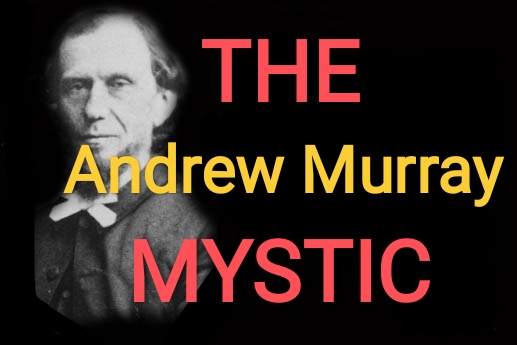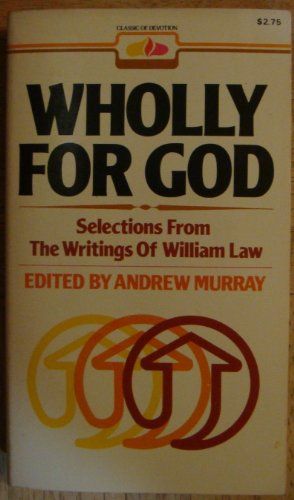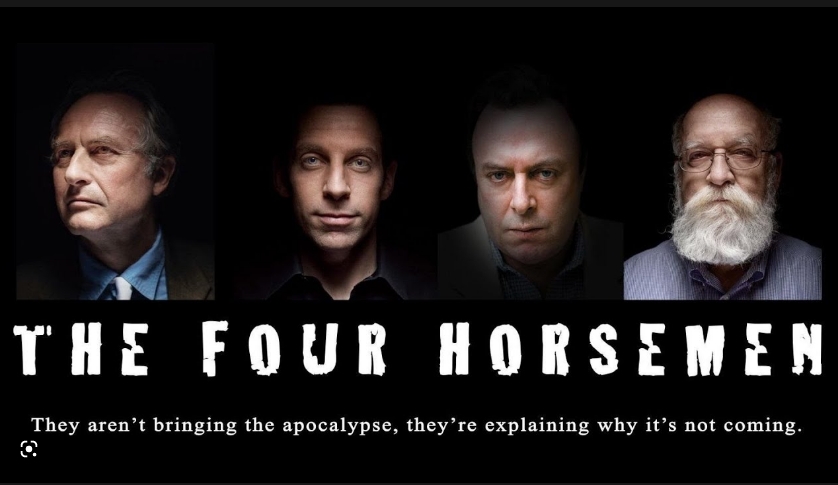ANDREW MURRAY’S MYSTICISM (PART 2)

Andrew Murray’s mysticism
Perhaps the following facts about Andrew Murray’s mysticism are not so widely known as the many books he had written. Nonetheless, as you may see, it mirrors universal mysticism to its core.
Murray’s books resonated so well with audiences of all times, that some of them eventually were regarded as classics in Western spirituality and are still in print.
They reveal his mystical interest, focusing on, for example, mystical language (awakening to a sense of the divine presence), waiting on God in sympathy and stillness, nurturing the love of the innermost heart, seeking communion with God, and withdrawing into the seclusion of the inner sanctuary of communion with God, or as the mystics like to call it, an “impulse we carry within.” [1] (Emphasis added].
Western Spirituality?
Western spirituality? Surely, the term can be applied to any kind of spirituality, including that of the Eastern religions.
Indeed, countless individuals are practicing spiritualities throughout the West without a hint of it being close to “Christian,” despite it having been so cleverly labeled as “Christian.”
Western and Eastern spiritualities have ingeniously been intermingled (Isaiah 2:6) that even Eastern practices such as Yoga (to be yoked to your own choice of a god) have been dubbed “Christian.”
One of the most resounding confirmations of Murray’s mystical universalism is the introduction he wrote to William Law’s “Wholly for God: the true Christian life,”[2] (1681–1761), one of the most prominent Protestant mystics of the eighteenth century.
Murray affirms,
“The most powerful and suggestive writers on the Christian life, it has been my privilege to become acquainted with. The present volume is a proof of my high appreciation of his teaching, and my desire to let others share with me in the profit to be derived from it.”
Amidst Murray’s accolades of William Law, he admits that there are errors and dangers in mysticism but that the mixture of truth and error is not such a bad thing because the truth outweighs the errors.
In the Preface to Robert Alfred Vaughan Vaughan’s Hours with the Mystics, the author writes: “Mysticism, though an error, has been associated, for the most part, with a measure of truth so considerable, that its good has greatly outweighed its evil.”
How could he have missed the stern warning in 2 Corinthians 6:14-15, “. . . what fellowship hath righteousness with unrighteousness? and what communion hath light with darkness? And what concord hath Christ with Belial?”
His statement that so much more good than evil resides in mysticism cannot but strike one as being completely at odds with the Word of God. It would be more correct to say: Mysticism, because it is at root a truth, its good has, notwithstanding a considerable amount of error, greatly outweighed its evil.[3]
The merits of truth (good) are not determined by pitting it against lies (evil). For some good may be something completely different from what others may deem evil. It opens a path of confused subjectivity and eventually to universality where good and evil swim happily together in a muddy pool of feigned togetherness.
There is no such thing as placid brotherliness between good and evil, truth and error in the Bible. Yet, according to Andrew Murray, good and evil may live side by side in good neighborliness in mysticism, as long as the good outweighs (and not supersedes) the evil.

For Vaughan mysticism is at its root an error (evil) but brings forth good so considerable that it outweighs the evil, while Murray in humility regarded this to be inaccurate because for him mysticism is at its root a truth that outweighs evil. Here, Murray is in sync with the New Atheist, Sam Harris, who said, “Not being wrong [and therefore claiming to always be right] is not the ultimate state of being for people in this life.”
Murray’s statement that “mysticism is a truth” suggests that God’s Truth is insufficient and, therefore, should be enhanced by other truths, such as mysticism, of which all “true religions” (Christianity, Hinduism, and Buddhism, Taoism, etc.) are a chip off the old block, according to Murray.
What does God Say About Such a Travesty?
Woe unto them that call evil good, and good evil; that put darkness for light, and light for darkness; that put bitter for sweet, and sweet for bitter! (Isaiah 5:20).
Murray’s definition of mysticism is a hodgepodge of good and evil, with good scoring a victory over evil, and accordingly makes a mockery of God’s definition of good versus evil.
If God alone is good (Truth) (Luke 18:19) and Satan the father of all lies, deceit, evil and errors (John 8:44), then both these luminary gentlemen are promoting a Baphometic god symbolizing the equilibrium of opposites”: half-human and half-animal, male and female, good and evil.
God is not in the business of making a distinction between truth and error as if to weigh both on a scale to see which way it tips. “Either make the tree good, and his fruit good; or else make the tree corrupt, and his fruit corrupt: for the tree is known by his fruit.” (Matthew 12:33).
This definition from the lips of our Saviour, Jesus Christ, plainly and effectively destroys the calisthenics of mysticism.
In a word, Murray’s mystical baking ingredients, containing both truth and error, are the very substance giving rise to the evil of universalism.
Henceforth, it is no surprise that even some New Atheists[4] began to dabble in drugs. It naturally led them to practice contemplative meditation that produces the same mystical experiences without drugs. This is probably what Sam Harris learned when studying in India and Nepal and for two years on silent retreat. The Guardian wrote,

THEY’RE EXPLAINING WHY ITS NOT COMING
from LTR: Richard Dawkins, Sam Harris, Christopher Hitchens, Daniel C. Dennet. One is dead, two are rather inactive and the youngest is experimenting with other possibilities – Eastern meditation. Moreover, God laughs at those who say “Let us break apart their [divine] bands [of restraint], And cast away their cords [of control] from us.” (Psalm 2:2-3). God controls the future, including the apocalypse, and not a bunch of MDMA freaks.
He had not long before completed a philosophy degree at Stanford University, having taken an 11-year break from an English degree he had been doing. In that earlier university stint he had experimented with MDMA, which led to an interest in meditation, studying in India and Nepal and two years on silent retreat in one-week to three-month increments.
He says the west could learn a lot from the east – not Islam, but the traditions of meditation found in Hinduism and Buddhism.
With meditation you recognise there is another possibility. It’s the practice of learning to break the spell and wake up.
“We are sleepwalking, and when you learn how to meditate, you recognise that there is another possibility, which is to be vividly aware of your experience in each moment in a way that frees you from routine misery. Meditation is simply the practice of learning to break the spell and wake up.” [DTW Comment: It sounds a lot like Murray’s mystic “awakeneing” as described above].
Harris, no slouch when it comes to the commercial possibilities of new tech, has just released a meditation app. Despite all this, when I ask him what this spirituality answers to in his character, he says something I find quite unexpected.
“We need to live our lives with more than just understanding facts,” he says. “Not being wrong is not the ultimate state of being for people in this life.”[5] (Emphasis added].
I can assure our esteemed New Atheist that “being wrong” in God’s equation of right or wrong can be the very last step on the slippery road to hell.
To affirm his taste for mysticism as “profit” and “because it is at root a truth,” Murray continues to write,
“Mysticism has been defined as belief in an immediate and continuous communication [interaction] between God and the soul, which may be established by means of certain peculiar religious exercises; as belief in an inner light, which may almost dispense of the written revelation.
This definition identifies mysticism too closely with its extravagances, its unsound developments, and overlooks that there is a mystical element in all true religion, both objectively in the revelation and subjectively in the faith.
According to common acceptation, mysticism is simply a one-sided development of that element.”
It is evident from what has just been said that it is not easy to define what mysticism is. It is not a system of doctrine.
It is found in all religious systems, in heathenism and pantheism, as well as in Christianity.
With the Church of Christ, it is not a sect or party; every Church has its representatives. In every complete Christian character, there is an element of mysticism. It is the outgrowth of a certain disposition or temperament, which ever seeks for the deepest ground or root of spiritual things.[6]
Lange says (Herzog-Schaf Cyclopcedia):
In Murray’s assessment the more extravagant style of mysticism, comprised of peculiar religious exercises that almost dispense of the Word of God, ignores the fact that there is mysticism in “all true religion,” objectively in the revelation (God’s Word) and subjectively in the faith, as he himself asserted.
Murray seems to have tried to marry the objective (impartial) truth found in the Word of God and the subjective (intuitive) quality of “faith” in mysticism, which he calls “a certain disposition or temperament, which ever seeks for the deepest ground or root of spiritual things.”
In doing so, he plays a dangerous game of dualistic religiosity. There is nothing subjective (based on or influenced by personal feelings, tastes, or opinions) in Jesus Christ’s command “believe in God, believe also in me.” (John 14:1).
The Word of God Asserts With Unreserved Certainty
Be ye not unequally yoked together with unbelievers: for what fellowship hath righteousness with unrighteousness? and what communion hath light with darkness? And what concord hath Christ with Belial? or what part hath he that believeth with an infidel? And what agreement hath the temple of God with idols? for ye are the temple of the living God; as God hath said, I will dwell in them, and walk in them; and I will be their God, and they shall be my people. Wherefore come out from among them, and be ye separate, saith the Lord, and touch not the unclean thing; and I will receive you, (2 Corinthians 6:14-17).
The overlaying of Christianity and paganism is not sanctification, the one thing Andrew Murray persistently and vigorously argues for in all his books. It is defilement at its very best.
The epitome of sanctification, as seen from the above passage in Second Corinthians, is God dwelling in, and walking in the saint who obediently comes out from among all forms of paganism, including mysticism, separates him from everything that displeases God, refrains from touching the unclean thing. (Psalm 1), taking up your cross, and following Him.
The intermingling of heathenism and Christianity via mysticism is a recipe for disaster because it opens the mystic to demonic influences.
If mysticism is not so easy to define and is not a system of doctrine, who gave Murray and so many other mystics the right to give it a Christian character?
Biblical Christianity is solidly based on doctrine. (2 John 1:9).
Jesus succinctly said,
“Sanctify them through thy truth: thy word is truth.” (John 17:17) and through Paul, “Preach the word; be instant in season, out of season; reprove, rebuke, exhort with all longsuffering and doctrine.” (2 Timothy 4:2).
It is impossible to preach the Gospel in season and out of season, to rebuke and exhort with all longsuffering without sound doctrine.
You can seek for the deepest ground (Murray loves to use flowery superlatives) or the root of spiritual things and miss the mark by a thousand miles when biblical doctrine is set aside.
But you may want to ask, what about all the beautifully bejeweled and doctrinally sound books he wrote? Are they not a living testimony of his love for God and his doctrines?
To answer the question, we first need to ask a reciprocal question: Why is God so steadfastly jealous of his word and the sound and untainted preaching thereof?
The simple answer is that it sets one free from error, deceit, malignant teaching, and its false teachers, and guides you on the strait and narrow way, and not on a journey of ill-fated mysticism. (Matthew 7:13-14).
Satan does not transform himself into an angel of light and his ministers into ministers of righteousness for no reason. (2 Corinthians 11:14-15).
Their most obvious reason is to present God’s truth in ways that seem to be strictly biblical but in the long run lead multitudes astray.
Mankind’s aptitude for byways is far greater than its propensity for truth.
The most successful way to lead them onto byways is to start off with one way (the truth) and then gradually split it into two ways — the one based on solid biblical doctrines and the other devoid of doctrines, for the sake of love, unity, and commonality, aka mysticism.
Andrew Murray’s Mystery With Regard to Mysticism
At any rate, how Murray was able to determine the percentages of truth and error in mysticism, is a mystery in itself. He must have read every single book on mysticism and not only William Law’s books to come to a well-informed conclusion.
Read part 1 here.
[1] Theo C. de Villiers, Is Dr. Andrew Murray a Mystic? M.A. Thesis, University of Stellenbosch, 1919, 27.
[2] Andrew Murray, “Introduction,” in Andrew Murray, ed., Wholly for God. The True Christian life. A Series of Extracts from The Writings of William Law (New York: Anson D.F. Randolph, 1893), xxi.
[3] Murray, “Introduction,” xx
[4] The main four authors were Richard Dawkins, Christopher Hitchens, Daniel Dennett and Sam Harris. And the movement was called the New Atheism.
[5] https://www.theguardian.com/books/2019/feb/16/sam-harris-interview-new-atheism-four-horsemen-faith-science-religion-rationalism
[6] Murray, “Introduction.” xxi

Years ago I would read some of Andrew Murray’s books and could never read one of them through to the end. I remember reading some pages and paragraphs over and over but could not find the doctrinal truth that should be there. I now recognise the pure evil mysticism in his writings.
But I have to admit I would read DTW articles and because I was not reading my Bible and relying on “traditional church religion” I had to read some articles over and over again but the difference was I could also easily check scripture references. “doctrinally sound” writings and teachings should always focus on Jesus Christ.
I homeschool our children and part of our devotions for now is to to take every book of the Bible from OT to NT and search for the types, symbolism and picture pointing to Messiah Jesus Christ.